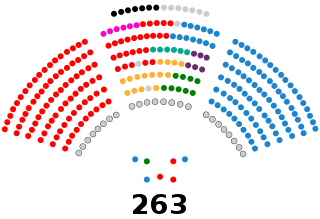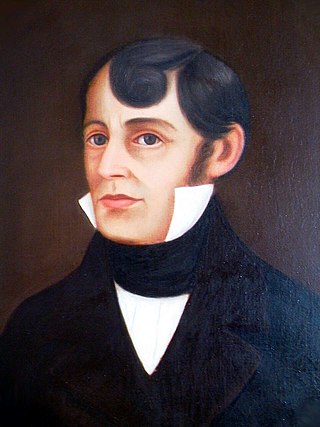
The politics of Costa Rica take place in a framework of a presidential, representative democratic republic, with a multi-party system. Executive power is exercised by the president and their cabinet, and the President of Costa Rica is both the head of state and head of government. Legislative power is vested in the Legislative Assembly. The president and 57 Legislative Assembly deputies are elected for four-year terms. The judiciary operates independently from the executive and the legislature, but is involved in the political process. Costa Rica has a strong system of constitutional checks and balances. Voting is compulsory, but this is not enforced.

The politics of Zambia takes place in a framework of a presidential representative democratic republic, whereby the president of Zambia is head of state, head of government and leader of a multi-party system. Executive power is exercised by the government, while legislative power is vested in both the government and parliament. Formerly Northern Rhodesia, Zambia became a republic immediately upon attaining independence in October 1964.

The Senate is the upper house of the Cortes Generales, which along with the Congress of Deputies – the lower chamber – comprises the Parliament of the Kingdom of Spain. The Senate meets in the Palace of the Senate in Madrid.

The National Assembly is the legislature for Venezuela that was first elected in 2000. It is a unicameral body made up of a variable number of members, who were elected by a "universal, direct, personal, and secret" vote partly by direct election in state-based voting districts, and partly on a state-based party-list proportional representation system. The number of seats is constant, each state and the Capital district elected three representatives plus the result of dividing the state population by 1.1% of the total population of the country. Three seats are reserved for representatives of Venezuela's indigenous peoples and elected separately by all citizens, not just those with indigenous backgrounds. For the 2010 to 2015 the number of seats was 165. All deputies serve five-year terms. The National Assembly meets in the Federal Legislative Palace in Venezuela's capital, Caracas.

The Congress of the Dominican Republic is the bicameral legislature of the government of the Dominican Republic, consisting of two houses, the Senate and the Chamber of Deputies. Both senators and deputies are chosen through direct election. There are no term limits for either chamber.

Elections in Venezuela are held at a national level for the President of Venezuela as head of state and head of government, and for a unicameral legislature. The President of Venezuela is elected for a six-year term by direct election plurality voting, and is eligible for re-election. The National Assembly (Asamblea Nacional) has 165 members (diputados), elected for five-year terms using a mixed member majoritarian system. Elections also take place at state level and local level.

The Legislative Assembly forms the unicameral legislative branch of the Costa Rican government. The national congress building is located in the capital city, San José, specifically in Carmen district of the San José canton.

The Costa Rican civil war was a civil war in Costa Rica from 12 March to 24 April 1948. The conflict began after the Legislative Assembly of Costa Rica, dominated by pro-government representatives, voted on 1 March 1948 to annul the results of the presidential elections of 8 February, alleging that the triumph of opposition candidate Otilio Ulate over the ruling party's Rafael Ángel Calderón Guardia had been achieved by fraud. This triggered an armed uprising led by José Figueres Ferrer, a businessman who had not participated in the elections, against the government of President Teodoro Picado.

The Politics of Serbia are defined by a unitary parliamentary framework that is defined by the Constitution of Serbia in which the president, currently Aleksandar Vučić, is the head of state while the prime minister, currently Ana Brnabić, is the head of government. Executive power is exercised by the Serbian government and the President of Serbia. Legislative power is vested in the unicameral National Assembly which is composed of 250 proportionally elected deputies. The judiciary is independent and is headed by the Supreme Court of Cassation, which is also the highest court in Serbia.

General elections were held in Costa Rica on 7 December 1913, the first direct elections since 1844. They were also the first elections to have universal male suffrage, after economic and educational requirements were eliminated. Máximo Fernández Alvarado of the Republican Party won the presidential election, but both he and runner-up Carlos Durán Cartín later resigned and Alfredo González Flores was appointed president by Congress on 8 May 1914. The Republican Party also won the parliamentary election.

General elections were held in Costa Rica on 2 December 1923. Ricardo Jiménez Oreamuno of the Republican Party won the presidential election, whilst the party also won the parliamentary election, in which they received 51% of the vote. Voter turnout was 70% in the presidential election and 84% in the parliamentary election.

General elections were held in Costa Rica on 8 February 1948. Otilio Ulate Blanco of the National Union Party won the presidential election with 55% of the vote, although the elections were deemed fraudulent by members of the governing National Republican Party. The results were annulled by Congress, leading to the six-week Costa Rican Civil War later that year. Following the war, the results of the parliamentary election were also annulled.

The National People's Congress (NPC) is the national legislature of the People's Republic of China. With 2,980 members in 2023, it is the largest legislative body in the world. The NPC is elected for a term of five years. It holds annual sessions every spring, usually lasting from 10 to 14 days, in the Great Hall of the People on the west side of Tiananmen Square in Beijing.

The Constitution of Costa Rica is the supreme law of Costa Rica. At the end of the 1948 Costa Rican Civil War, José Figueres Ferrer oversaw the Costa Rican Constitutional Assembly, which drafted the document. It was approved on 1949 November 7. Several older constitutions had been in effect starting from 1812, with the most recent former constitution ratified in 1871. The Costa Rican Constitution is remarkable in that in its Article 12 abolished the Costa Rican military, making it the second nation after Japan to do so by law. Another unusual clause is an amendment asserting the right to live in a healthy natural environment.

The Free State of Costa Rica was the name acquired by Costa Rica after its split from the Federal Republic of Central America in 1838 and until the proclamation of the First Costa Rican Republic in 1847.
The Partido Agrícola was a political party of Costa Rica. It was founded for the 1923 general election and ran as candidate the wealthy aristocrat and lawyer Alberto Echandi Montero, father of the future president Mario Echandi Jiménez.

The history of the Costa Rican legislature is long and starts from even before its formal independence from the Spanish Empire. Costa Rica is one of the world's oldest democracies, thus, its parliamentary history dates back several centuries.

The Fundamental Law of the Free State of Costa Rica, sometimes called the Political Constitution of 1825, was issued on January 25, 1825 by the Constituent Congress of the State of Costa Rica and during a time the country was a formal member of the Federal Republic of Central America. It would function until it was abrogated by Braulio Carrillo Colina who in 1838 takes power in a dictatorial manner and issues on March 8, 1841 the Decree of Basis and Guarantees that will operate as a de facto constitution until the arrival of Francisco Morazán in 1844 who overthrew Carrillo and was temporarily restored.

The Founding Junta of the Second Republic was a de facto government which existed in the Republic of Costa Rica from May 8, 1948, to November 8, 1949, with the overthrow of the constitutional president Teodoro Picado Michalski, by a group of revolutionaries headed by José Figueres Ferrer.

Calderonism or Calderonismo is a political and ideological doctrine of Costa Rica, which emerged in the 1940s under the leadership of caudillo Dr. Rafael Ángel Calderón Guardia, before, during and after he was president with his National Republican Party, and which was continued by various political forces such as Unity Coalition, National Unification Party and the current Social Christian Unity Party and its split the Social Christian Republican Party. It is together with Liberacionismo one of the two traditional political tendencies of Costa Rican politics, with which it represented a certain type of Costa Rican bipartisanship from 1986 to 2002 and revolves around the Calderón family. It is a form of populist and Catholic Christian socialism very similar to Argentine Peronism.














